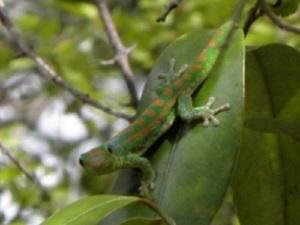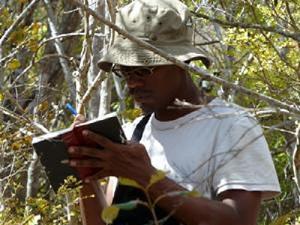Steeves Buckland
The aim of this project is to identify the status and critical needs (food and habitat requirements) and population genetics of P. guimbeaui species. The findings of this research will be utilised to extend their range, and most importantly, any small threatened sub-populations will be rescued and translocated onto a predator free island or nature reserve.

Phelsuma guimbeaui.
Over the past 400 years, there has been a drastic decline in the number of native species in Mauritius, losing 60% of its original reptile community. Out of 17 endemic reptile species, only five remain on mainland Mauritius, four of which are Phelsuma day geckos. The lowland day gecko (Phelsuma guimbeaui) is considered to be the most vulnerable species to extinction on Mauritius. Prior to the arrival of humans, P. guimbeaui is thought to have been found throughout the lowland dry forests around the island. In 2007- 2009, only 16 small sub-populations were rediscovered since the first survey in the 1970s. These sub-populations were found to be restricted to isolated fragments of habitat with a combined area of 62.45 hectares, representing less than 0.2% of their predicted 18th Century range. The overall distribution of P. guimbeaui is extremely fragmented and separated by large areas of agriculture. Most of the sub-populations are very small and found in degraded privately owned lands. These lands are being continuously cleared causing further isolation and fragmentation. Additionally, the recent invasion of the bigger predatory Madagascar giant day gecko (Phelsuma grandis) has increased the threats to the endemic P. guimbeaui; its future survival is now uncertain in places where the species coexist. The pressure of an ecologically similar gecko predator/competitor, combined with the ongoing process of habitat destruction and isolation, are likely to cause further extinction.

Steeves Buckland collecting home range data in the field.
Due to the unpredictable future of this species, its protection is undoubtedly of utmost conservation importance. However, to date, there is no detailed knowledge regarding this species. Prior to the formulation of any conservation management strategies, fundamental issues such as ecology, demography and biology need to be addressed. In an effort to reverse the decline of this endangered endemic day gecko, there will be three components to this project:
(1) research,
(2) applied conservation
(3) education.
To increase our current knowledge of P. guimbeaui, its status and critical needs will be identified by collating data on its distribution, diet, habitat requirements, home-range, abundance and population dynamics. These findings will be used to formulate a reintroduction programme into a secure site or nature reserve. Prior to translocation, genetic variations within and between the different subpopulations will be undertaken. The findings of the genetic study will be used to maximise the amount of variation within the translocated population to ensure long term viability.
This project is supported by the University of Bristol, National Park and Conservation Services (Government of Mauritius) and Mauritian Wildlife Foundation. Miss Laura Gallagher and Mr Sion Henshaw are currently assisting me on this project.